The Right Stuff' recap: What it takes to stand on the edge ('Ziggurat')
The seventh episode of "The Right Stuff" borrows its title from a tower that journalist Tom Wolfe used to define who had "the right stuff."
In Wolfe's 1979 book about NASA's first astronauts — which serves as the basis and namesake for the National Geographic series now streaming on Disney Plus — he wrote there was "a dizzy progression of steps and ledges, a ziggurat, a pyramid extraordinarily high and steep; and the idea was to prove at every foot of the way up that pyramid that you were one of the elected and anointed ones who had the right stuff and could move higher and higher and even — ultimately, God willing, one day — that you might be able to join that special few at the very top, that elite who had the capacity to bring tears to men's eyes, the very Brotherhood of the Right Stuff itself."
In "Ziggurat," the penultimate episode of the series' first season, it is Alan Shepard who attempts to ascend that tower, both literally and figuratively.
Related: These astronauts read 'The Right Stuff' and flew in space
Warning: What follows contains spoilers for the seventh episode, "Ziggurat." Skip ahead to the end if you only want to read about the space history portrayed.
- Want to try Disney Plus? You can get a 7-day free trial here
- Sign up for Disney Plus for $6.99/month
Episode 7: 'Ziggurat'

"First Gagarin and now this, it's been one hell of a damn week."
Mercury astronauts Gordon Cooper (Colin O'Donoghue), Gus Grissom (Michael Trotter), Wally Schirra (Aaron Staton), Scott Carpenter (James Lafferty) and Deke Slayton (Micah Stock) are in a hotel room watching a TV news report about the Bay of Pigs invasion, just days after Soviet cosmonaut Yuri Gagarin became the first human to fly into space (as referenced at the end of Episode 6).
Get the Space.com Newsletter
Breaking space news, the latest updates on rocket launches, skywatching events and more!
John Glenn (Patrick J. Adams) and Alan Shepard (Jake McDorman) are at the hotel bar watching the same report. "Al, I'm really sorry you're not the first man in space," says Glenn.
"No you're not," replies Shepard.
Later, outside the hotel, Space Task Group director Bob Gilruth (Patrick Fischler) and flight director Chris Kraft (Eric Ladin) hold a late-night meeting with Shepard, Glenn and Grissom about the situation in Cuba and President John F. Kennedy's response. "We woke you up to tell you that he needs a win, and he has decided that we are going to be that win," says Gilruth.
"Now, the administration has not decided when they are going to announce the flight to the public, but chances are it won't be until afterwards, once they know that Al has landed safely," Gilruth tells the men. "Kennedy might have grown a pair, but they don't get big overnight."
Gilruth tells Glenn he will back up Shepard, who will be launching in two weeks.
After the title card, the scene changes to Shepard in the Mercury spacecraft simulator. Scott Carpenter is serving as his capcom [capsule communicator], as Shepard proceeds through a retro-fire sequence. "I'm showing that the spacecraft is tumbling. Should I be in retro attitude bypass?" asks Shepard.
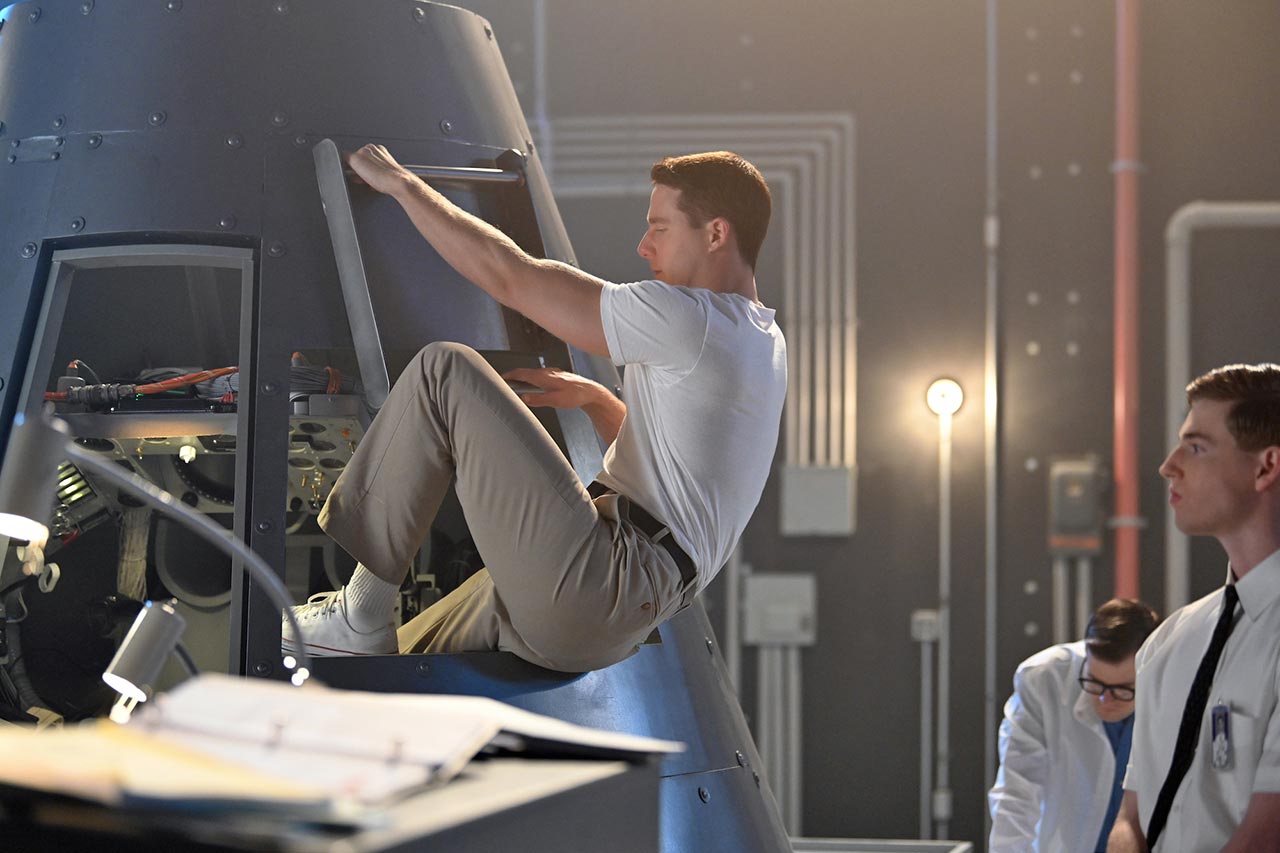
Carpenter fails to answer in time and the simulation ends with Shepard pulling himself out of the mockup. "What the hell just happened?" Shepard asks flight controller Roy Hutmacher (Joshua Ritter), who explains he wasn't in retro attitude when they fired the thrusters. "What is the point of having manual controls if the ground fires the damn rocket without me knowing about it?"
Carpenter tries to explain, but Shepard walks away, annoyed.
Related: The Mercury 7 astronauts: NASA's first space travelers
Elsewhere, aviator Jerrie Cobb (Mamie Gummer) is riding a spinning chair at the Lovelace Clinic in New Mexico. She had been riding it "longer than anyone else, ever." Cobb looks unfazed.
The scene changes to the bedroom of Cooper's daughter, Cam (Chandler Head). Trudy (Eloise Mumford), Cooper's wife, comes in with a magazine article about Cobb and tells Cam about how Cobb is putting together a team of women to train to go into space "and one of the other pilots is your mom," says Trudy.
"Wait, you're going to be an astronaut, just like dad? You're really going to do it?" Cam asks excitedly before becoming engrossed in the magazine article.
Back at the bar, Grissom, Schirra, Carpenter, Slayton and Cooper are passing around the same copy of Aviator magazine, but instead of being enamored with Cobb's effort, they are mocking it. Cooper, knowing his wife's desire to be part of the team, tries to defend the idea. "You know, it might not be the worst idea. Why couldn't one go to space?" he asks, referring to a woman. The other men scoff, citing "menstruation," among other reasons.
Shepard comes in but, instead of joining the other guys at their table, he heads for Kraft, who is sitting at the bar. "If you want me to be taking my cues from the ground, we both could use a man we trust on capcom. Now, I have nothing against Scott personally, but this is not his first screw-up. He's not ready and you know it," says Shepard. Kraft agrees to "run it up the flagpole" with those who make the assignments.
Shepard then presents Kraft with one of the letters that Glenn wrote expressing his concerns over Shepard being picked to be the first American to launch into space (as shown in Episode 6). Kraft tells Shepard that Glenn has been warned and "he knows to stand down. Let it go."
"John's talented, he belongs in the program, but put yourself in my shoes. He is my backup. He will be the one checking my straps on my seat while I load into that capsule. And now I find out he has been going around trying to stab me in the damn back?" Shepard complains.
In the parking lot of the Starlite Motel, Carpenter appeals to Glenn for help after being "demoted" from capcom to flying chase for Shepard's mission. "Shepard's right, you weren't prepared," says Glenn. "He's putting his life on the line here. I think you're a good man, better than the rest of these guys, and yeah, I think that matters. Or at least it ought to."
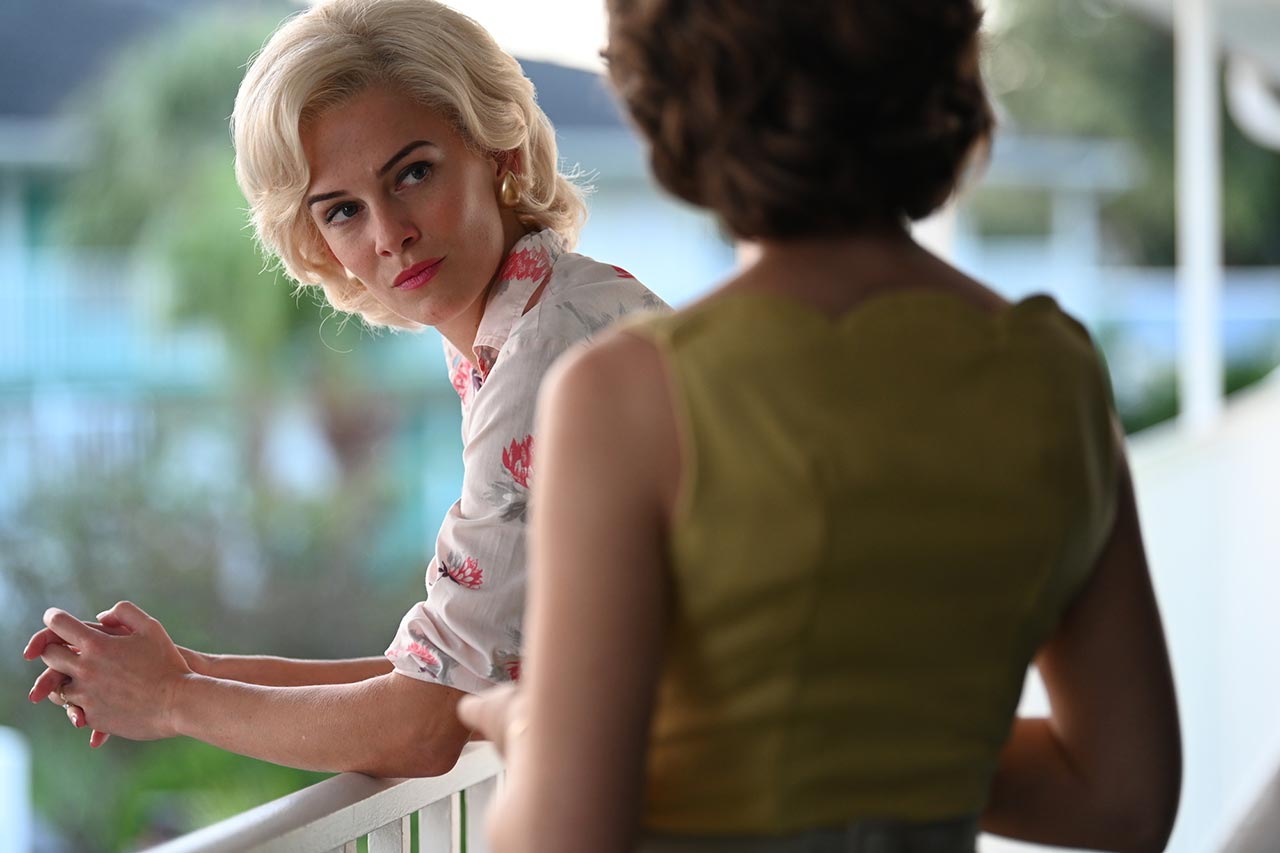
Glenn sympathizes with Carpenter but tells him they cannot "go grousing up the chain of command. You're a Navy man and I'm a United States Marine. Why don't we get our heads up and start acting like it."
At a party 36 hours before Shepard's scheduled launch, Kraft's secretary Eunice (Jordan Blair Mangold Brown) gifts Glenn with a St. Christopher medal, the patron saint of travelers. "We all know it is you, John," unaware like the rest of the world that Shepard has been selected to fly first. "You will be closer to the Lord than any believing man's ever been. Get him to bless this, will you?"
"I know it's been hard for you, having to pretend," Annie (Nora Zehetner), Glenn's wife, tells him once Eunice has left. "It will get easier once everyone knows."
Building Project Mercury: Test flight photos of NASA's first spaceship
At the Mercury Control Center the next day, flight controller Glynn Lunney (Jackson Pace) comes rushing in through the doors. "I just got a stack for press credentials. Three hundred of them. Kennedy is putting the launch on national TV live," he tells Gilruth, Kraft, Shepard, Glenn and Grissom. "Has everybody in DC lost their goddamn minds?"
"It is the only choice," says Kraft. "We live in an open society with a free press. We have to walk that walk now more than ever. This fight with the Soviets is about more than just science and bombs..."
"...It is a war of ideas, sure," Lunney interrupts. "Here's an idea for you. We have no idea how many cosmonauts the Russians killed before they sent Gagarin back alive." Kraft rebuts, saying they are better than the Russians and he knows they are ready.
"I sure hope you're right, because if not, we're about to throw Al the most expensive funeral in the history of TV," Lunney says, as he turns to walk out of the room.
Taking the talk of his possible death in stride, Shepard remarks, "Well, I guess Kennedy's nuts are growing pretty damn fast after all."
At a press conference, Schirra, Slayton, Cooper and Carpenter are fielding questions about who is going to be the first to launch. A reporter then asks what they think about sending a woman into outer space. Schirra volunteers Cooper to answer. "We sent up a chimp, didn't we? May as well send up a lady someday," Cooper jokes. "The only problem is the spacesuit makes you look kind of plump, and we all know the gals aren't going to like that."
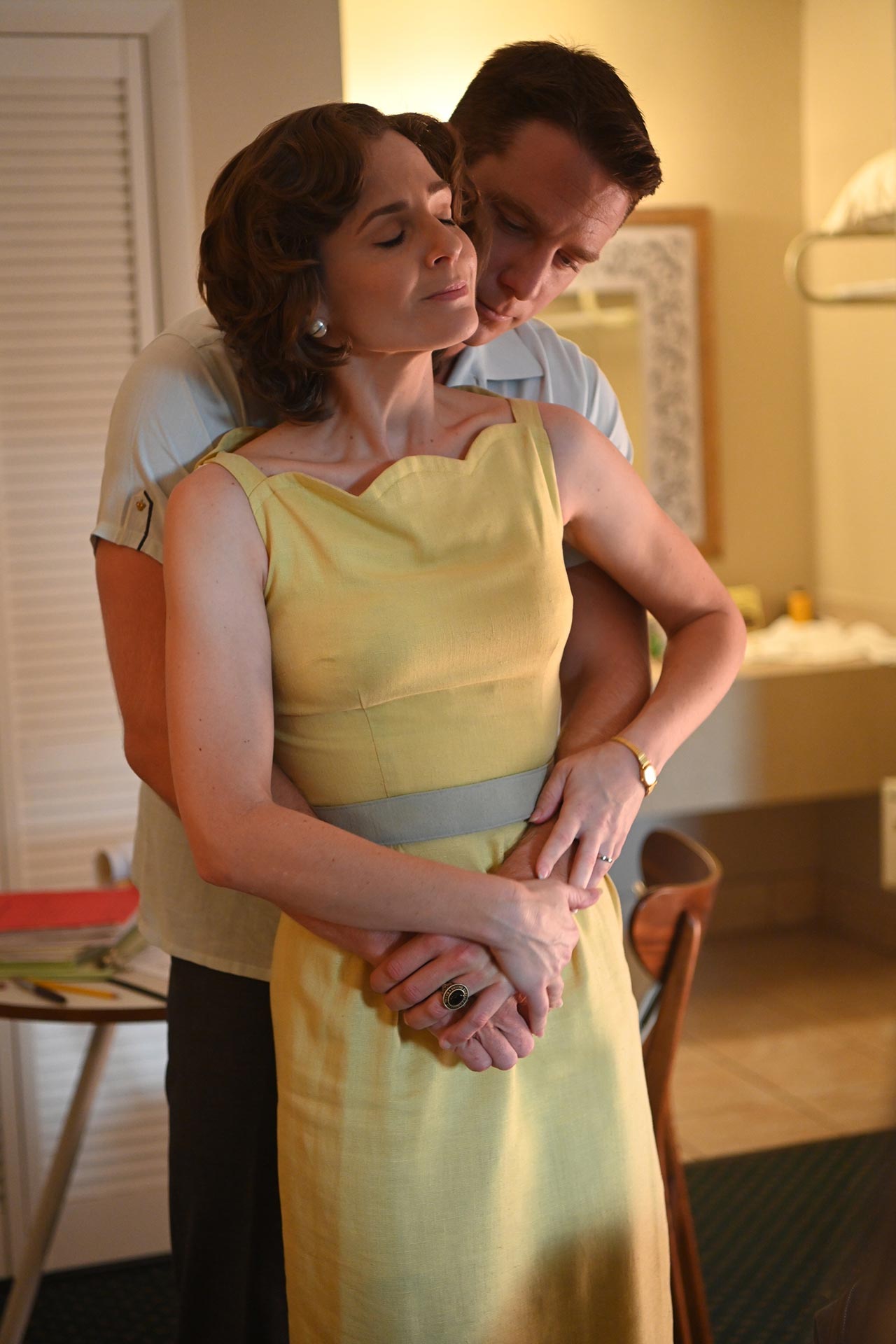
At the Coopers' home, Trudy and her two young daughters are watching the event on TV. Initially happy to see her husband, Trudy reacts solemnly to his remarks. After the broadcast ends, Cooper tries calling home but Trudy does not answer.
In his hotel room, Shepard discusses the worsening weather with his wife, Louise (Shannon Lucio), who he teases about being married to a soon-to-be national hero. "Once you're announced, I will have to share you with the whole world," she says, before reminiscing about how they first met at a dance. "You just walked up to me and started talking like you were my date. I never had anyone pay attention to me like that."
In another hotel room, Gilruth is listening to the radio and TV about the spectators who are lining up to see the launch the next day. A representative of the Florida Growers Association delivers a small orange tree. (The card reads, "We know you ORANGE going to let us down!")
At the control center, Hutmacher and Lunney are monitoring storms "up and down the coast."
Back at the hotel, Louise, now alone outside of Shepard's room, is confronted by Carpenter's wife, Rene (Jade Albany Pietrantonio), who is upset Al had her husband reassigned from being capcom. "The truth is, he's never been ready for any of this," says Louise about Carpenter.
"Look at you, you think you are so much better than the rest of us," replies Rene. "But my husband is a good man. He wasn't the one who got caught with some tart in Tijuana." (This exchange refers to the events depicted in Episode 5.)
Going back inside the room, Louise hides her disappointment from Shepard. She was clearly hurt learning about the affair from Rene.
Later, Louise and Annie watch as Shepard and Glenn board a van and leave with Grissom to get ready for the launch. "Don't worry, he'll be fine — unless John kills him," Annie says, breaking the tension and causing Louise to smile.
At the Cape Canaveral Air Force Station, NASA public affairs officer John "Shorty" Powers (Danny Strong) reads back the draft of a contingency release announcing that Shepard has perished — to Shepard, who gives his approval.
Time passes and Shepard is now staring at himself in a mirror in crew quarters. A series of flashbacks to earlier episodes' scenes show the times he experienced a ringing in his left ear. Shepard snaps and the recollections stop.
Shepard and Glenn sit down for a steak and eggs breakfast (the scene is the same as shown at the start of Episode 1). The two then report to the infirmary for Shepard's pre-launch checkup by nurse Dee O'Hara (Kaley Ronayne) and Dr. Vance Marchbanks (Christopher Mann). Shepard is also given a psychological exam. When asked about his concern for his wife by Dr. Noyes (Philip Nolen), Shepard replies, "Sixteen years as a test pilot's wife, Louise can handle just about anything."
Glenn, who is waiting patiently, thinks back on his own desire to be first (as shown in a scene from the series' first episode). "Shepard passed his physical. You're done for now," Dr. William Douglas (Ed Amatrudo) says, releasing Glenn from his duty as backup.
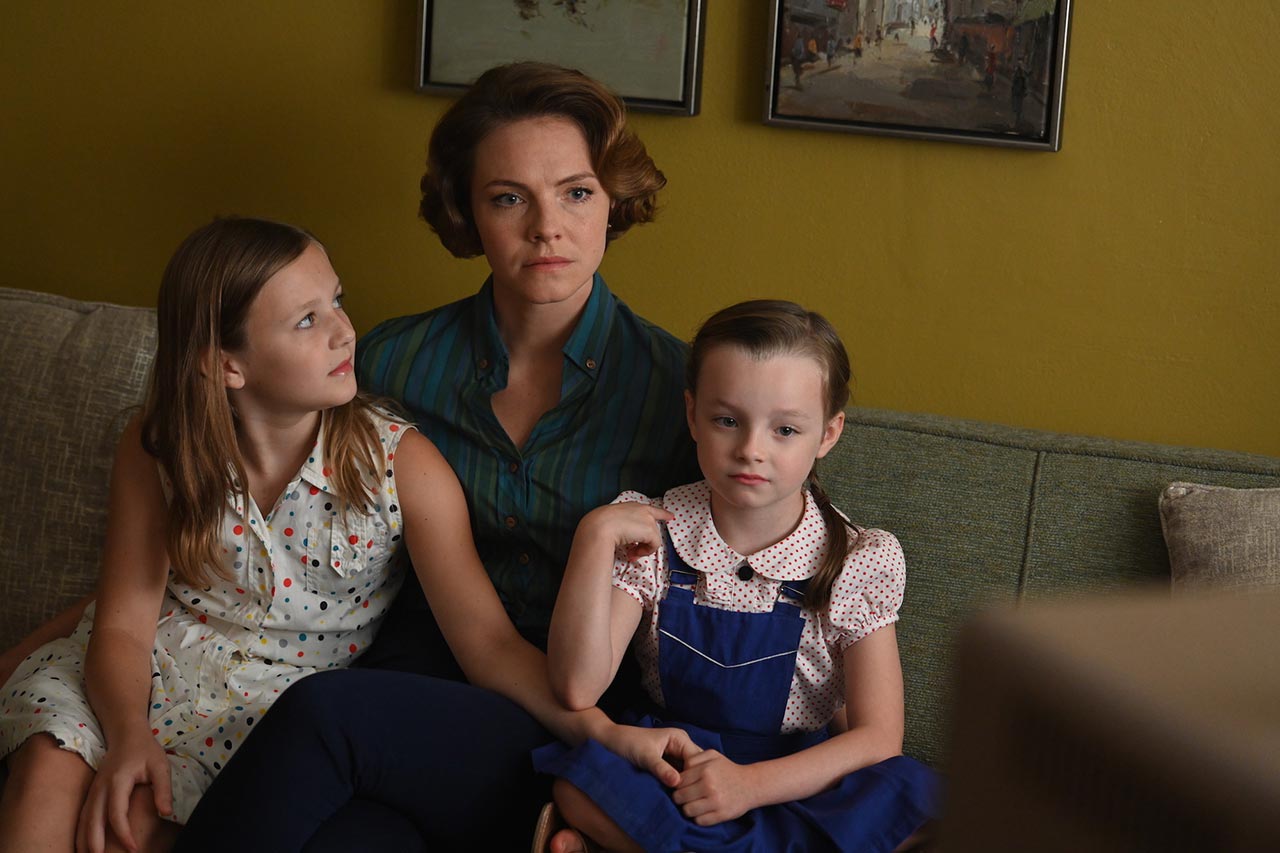
Louise sits at the bar at the Starlite Lounge, listening to the rain outside. Henri Landwirth (Christopher Cassarino), the hotel's manager, pours her a drink. "Well, beautiful night to launch a rocket," he quips.
Back at crew quarters, Grissom helps Shepard get suited up in his silvery Mercury pressure suit. At mission control, the flight controllers proceed through the countdown. At his office, Gilruth discusses the rain with Kraft. "We have two more storm fronts making their way along our coast, but Bob, we got a real solid shot at 30 minutes right between them," says Kraft.
"Scrub this flight, we go again in two days. But Chris, if we get this wrong, the program is finished for good," warns Gilruth.
"You know the problem with playing it safe, Bob?" asks Kraft.
"You never know if you got it right," Gilruth says with a slight smile.
Shepard is again thinking of the past (a quick series of scenes from past episodes show his path to becoming the first astronaut to launch) and goes to walk out for his ride to the launchpad when he is stopped by Gilruth. "Bad news, Al," he says, as thunder is heard in the background. The weather has scrubbed the launch.
Later, out of his pressure suit but still in his undergarments, Shepard steps outside to look up and see a clear sky emerging. The press, waiting outside of Hangar S, spot Shepard and make a run for him before he dashes back inside.
LIFE magazine reporter Loudon Wainwright (Josh Cooke) finds Glenn inside crew quarters. "The secret is out. Some of the boys spotted Al in his flight gear," he tells Glenn. "I'm sorry John, it really should have been you."
In the infirmary, the medical staff and Shepard sit, deflated, when Douglas breaks into song, Merle Travis' "Sixteen Tons." Before long, all of them are singing, "You load 16 tons and what do you get? Another day older and deeper in debt. St. Peter don't you call me because I can't go, I owe my soul to the company store."
The levity ends when Louise arrives. The staff leaves so she can be alone with her husband. "I'm so sorry Alan," she says.
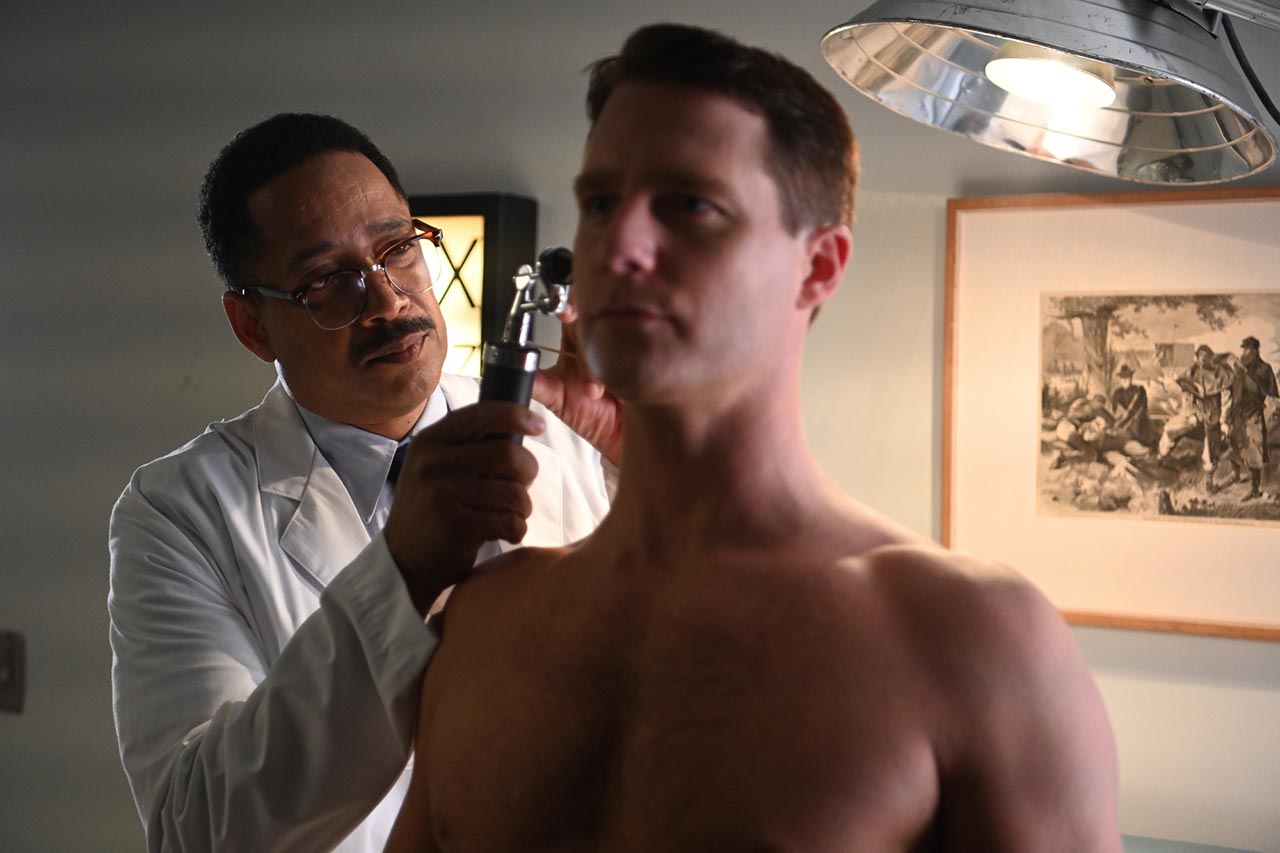
"They could've just held their nerve, I'd be up in Grand Bahama right now," says Shepard. "It is going to take two full days to recycle the fuel, there is not a cloud in the sky and they are keeping me restricted to base now that everyone knows I'm the guy."
Louise announces that she is flying home to Virginia. "How is it going to look if you're not here?" Shepard asks.
"Now you are worried about how things will look?" Louise asks incredulously. "I don't ever want to hear about your indiscretions from anyone. I am not going to go through this again. I can't just sit back and smile and pretend to be your perfect little wife. I am going back home."
After Louise leaves, Shepard tells Glenn that he is going out, that he needs some air. "You're supposed to lay low," says Glenn. "We're supposed to stay together. I don't like it any more than you do, but those are our marching orders. There are a thousand reporters out there, where would we even go?"
The scene changes to an overhead view of the roof of Hangar S. Shepard is near the ledge, smoking a cigarette. Glenn walks up behind him. "Whenever I'm put out, I just have to remember that it is all God's plan, all of it," Glenn tells Shepard. "You just weren't meant to go up today, that's all."
"What do you think, John, was it God's plan for you to send those letters?" Shepard asks, revealing he knows what Glenn wrote.
"You know, you're a great pilot, Al, but I didn't write a thing in those letters that isn't true. You're not the right man for this job, and you wouldn't even be wearing that spacesuit if I hadn't saved your bacon in San Diego," replies Glenn.
"But that wasn't enough for you, was it, John? To help me," says Shepard. "No, you had to make sure everyone knew about it. And that is exactly why no one likes you, John. You're a miserable sanctimonious ass and it came back to bite you. That's why I am going up and you're not."
"You want to hurt me, you want something bad to happen to me," Shepard says. "You know, I bet you would love it if I just stepped over the edge there, wouldn't you? If I took a little swan dive onto the cement? Of course you would, because then you'd be first and that is all that really matters to you, John, no matter how much you raise the flag or thump the bible."
"This right here is the difference between you and me. I say what I want and I do it," continues Shepard. "You, John, sneak around others' backs like a lying snake. Have you got what it takes to stand on the edge and be the goddamn hero that you keep talking about?" Shepard steps up on the roof's ledge. "Have some guts and admit what you want."
"I can find love for you in my heart, Al. I want you to know that," says Glenn, slowly backing away.
Shepard steps down from the ledge.
In Photos: Yuri Gagarin, first man in space
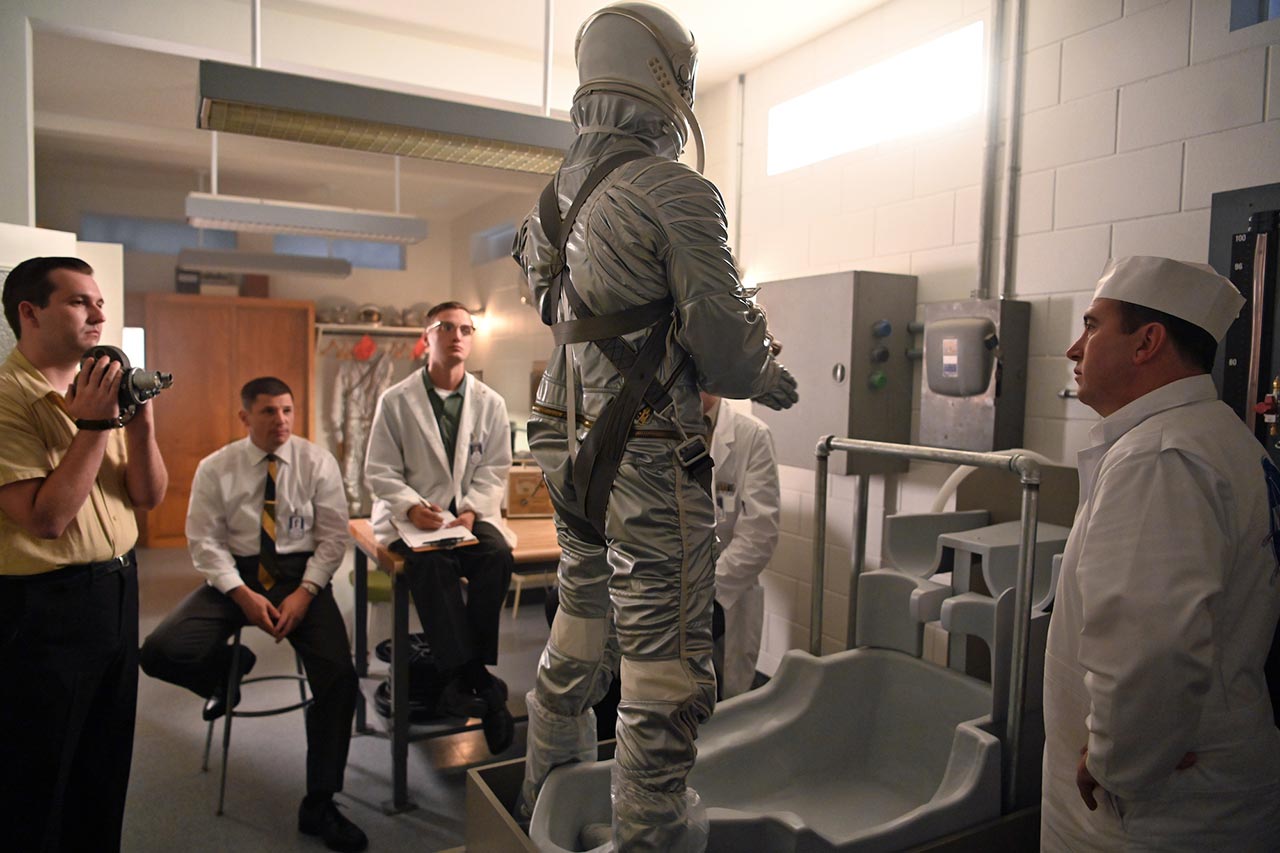
The right, wrong and real stuff
At the start of each episode, a disclaimer appears on screen: "This dramatization, although fictionalized, is based on actual events. Dialogue and certain events and characters have been created or altered for dramatic purposes." Here is a look at some of the right, wrong and real stuff the seventh episode portrays:
- Cosmonaut Yuri Gagarin launched into space on April 12, 1961. The Bay of Pigs invasion began five days later, on April 17.
- The fallout from the Bay of Pigs did not accelerate or directly affect the plans for Alan Shepard's launch. NASA conducted the Mercury-Atlas 3 test flight on April 25, 1961, and the Little Joe 5B launch escape system test flight on April 28, 1961. The Bay of Pigs is, however, attributed to changing Kennedy's attention to NASA. "In the aftermath of the fiasco, and because of the successful orbiting of astronauts by the Soviet Union, it is my opinion that Mr. Kennedy asked for a reevaluation of the nation's space program," T. Keith Glennan, NASA's first administrator, wrote in his diary at the time (as cited by historian Roger Launius in "Apollo's Legacy: Perspectives on the Moon Landings" [Smithsonian, 2019]).
- As depicted in the episode, Carpenter was reassigned from serving as Shepard's capcom to flying chase (he followed the Redstone rocket in a high-performance jet to monitor its progress in flight), but according to Kraft, it was he who made the request to Shepard, not the other way around as shown. In his book "Flight: My Life in Mission Control" (Dutton, 2001), Kraft described Carpenter as having failed several simulations at the capcom console. "He can't do it. He just doesn't understand what is going on," Kraft wrote, recounting what he told Shepard, who then saw to it that the change was made.
- Since its first attempts at launching a satellite in 1957, the U.S. space program operated in the open, allowing the press and public to witness its successes and failures. This was in contrast to the Soviet Union, which did not release information about its launches until they were determined to be a success. Kennedy did not decide to broadcast Shepard's launch live, but he did express concerns about it up until a day before the first attempt.
- Though there were test flights leading up to Gagarin's successful Vostok mission, there were no cosmonauts aboard the earlier launches.
- NASA's public affairs staff prepared statements for mission commentator Shorty Powers to deliver in the case of Shepard's death as a result of "certain contingency situations," according to Neal Thompson, Shepard's biographer, in "Light This Candle" (Crown Publishers, 2004). It is unknown if Shepard knew of or approved these statements in advance, which would have let the world know he "perished today in the service of his country.”
- In the episode, Cooper's (O'Donoghue) comparison of flying a woman in space to flying a chimpanzee was probably inspired by the real astronaut's comments at a 1963 press conference when he was asked about flying a U.S. woman in response to the Soviet Union having done so first (Valentina Tereshkova in June 1963). "Well, we could have used a woman on the second, actually the second orbital Mercury-Atlas that we had," Cooper said. "We could have put a woman up, the same type of woman, and flown her instead of the chimpanzee.”
- Louise Shepard was in Florida to spend time with her husband prior to his first launch attempt, but she flew home to Virginia before Shepard left for crew quarters in Hangar S.
- The memory that Shepard and Louise share about the dance in college is fictional. In reality, Shepard first met Louise at a dance where the two spent the night talking. He did not have to act like her date, nor did he step in on another man as said in the episode, because Louise' boyfriend was absent from the event. Later, after a courtship by letters, Shepard invited Louise to another dance where he would receive his class ring. Louise initially turned him down, but was ultimately won over and attended as his date.
- Dr. William "Bill" Douglas was Shepard's flight surgeon, as shown. Dr. Vance Marchbanks was the head physician for the Mercury Project and one of the first black flight surgeons in the Army and first in the Air Force. Dr. Noyes may be a substitute for psychiatrist George Ruff, who was part of the panel that screened the Mercury astronaut candidates and who evaluated the men before they launched. (As noted in earlier recaps, Dee O'Hara was the astronaut's nurse, as depicted.)
- The first attempt to launch Shepard on his Mercury-Redstone 3 (MR-3) mission was on May 2, 1961. The launch was scrubbed at 7:36 a.m. EST, 2 hours and 20 minutes before the targeted liftoff time, due to a solid cloud deck and rain, as depicted in the episode.
- Shepard did suit up for the May 2 attempt. The long undergarment that he wore under his pressure suit had ventilation spacer patches, as shown, but they were light brown or tan in color, not grey as depicted (they only appeared to be light grey in the black and white photos NASA released of Shepard suiting up).
- The press learned that Shepard was the pilot of MR-3 because NASA formally announced it, not because he was accidentally spotted in his flight gear as shown in the episode. NASA had taken steps to keep his selection a secret until launch day, but after the scrub, it was decided to reveal that Shepard would become the first American in space, with Glenn as his backup.
- Shepard did not retreat to the roof of Hangar S after the scrub. Instead he went for a run on the beach, viewed his Mercury capsule atop the Redstone rocket, reviewed his flight procedures in a trainer and took a nap.
- By the time of the first MR-3 launch attempt, Shepard and Glenn were no longer at odds with each other, contrary to what the episode portrays. As Glenn recalled in "John Glenn: A Memoir" (Bantam, 1999), "I worked hand-in-glove with him. I don't think our work showed any signs of the disappointment I, and the others, still felt at not being selected to go first. We all threw ourselves into supporting Al's flight as seriously as if we had been the one scheduled to fly."
A new episode of National Geographic's "The Right Stuff" begins streaming on Disney Plus every Friday through Nov. 20. Return to collectSPACE.com for weekly recaps.
Follow collectSPACE.com on Facebook and on Twitter at @collectSPACE. Copyright 2020 collectSPACE.com. All rights reserved.
Join our Space Forums to keep talking space on the latest missions, night sky and more! And if you have a news tip, correction or comment, let us know at: community@space.com.

Robert Pearlman is a space historian, journalist and the founder and editor of collectSPACE.com, a daily news publication and community devoted to space history with a particular focus on how and where space exploration intersects with pop culture. Pearlman is also a contributing writer for Space.com and co-author of "Space Stations: The Art, Science, and Reality of Working in Space” published by Smithsonian Books in 2018.In 2009, he was inducted into the U.S. Space Camp Hall of Fame in Huntsville, Alabama. In 2021, he was honored by the American Astronautical Society with the Ordway Award for Sustained Excellence in Spaceflight History. In 2023, the National Space Club Florida Committee recognized Pearlman with the Kolcum News and Communications Award for excellence in telling the space story along the Space Coast and throughout the world.










